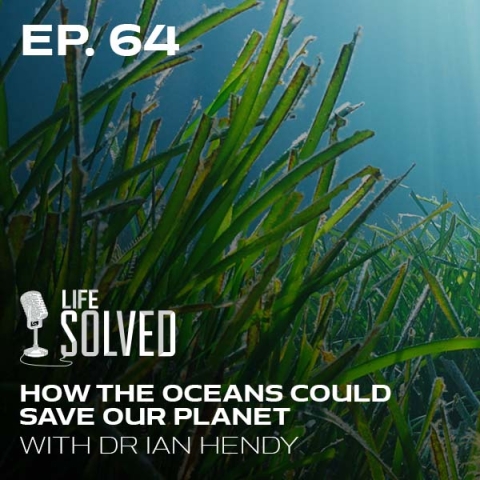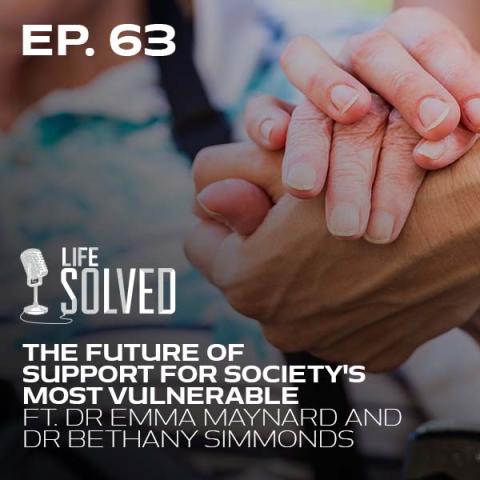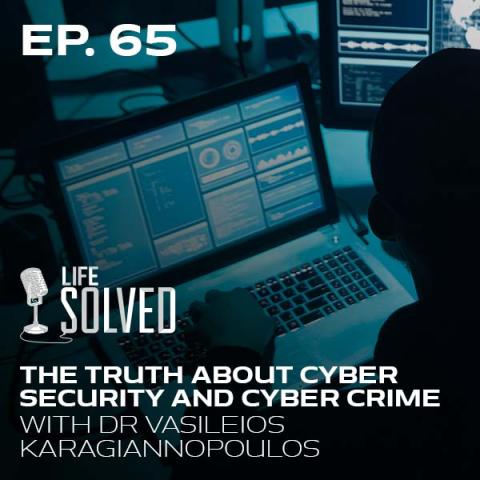

Have you ever thought about the power of marine environments?
32 min listen
How the Oceans Could Save Our Planet ft. Dr Ian Hendy
You’ve probably heard of reforestation projects, or even peat bog restoration as examples of how nature can help us capture carbon, but have you ever thought about the power of marine environments?
Dr Ian Hendy is a Tropical Marine Ecologist and Course Leader for Marine Biology at the University of Portsmouth. In the latest episode of the Life Solved he shares some insights into the incredible capacity these natural ecosystems hold in the fight against climate change.
In order to reach our net zero goals, carbon capture and storage is a vital part of the equation. By removing carbon emissions from the atmosphere we can slow and hope to stop the warming, ‘greenhouse effect’ this causes. In addition to clever technical innovations, scientists are increasingly turning to natural processes to help us out. These are known as ‘nature-based solutions’ Ian says coastal and marine environments hold some of our most precious assets here. From sea grasses and kelp forests in our chilly British waters to mangroves in tropical environments.
The marine biome is by far the biggest biome on the planet. Organisms here will have a very good climate change mitigation impact so they can draw down CO2, get those greenhouse gases, they store them in the sediments, they create nice carbon sinks. And of course, they create structure, are a nursery function for fish and reduce coastal erosion, so they’re very good natural storm defences.
Dr Ian Hendy, Tropical Marine Ecologist and Course Leader for Marine Biology
In the podcast Ian explains how integrating the socioeconomics of a region is fundamental to the success of projects that aim to restore flora and fauna in marine environments. Often coastal development or intensive fishing can come into conflict with local ecosystems and he shares examples of projects that are working with communities to adapt and maintain livelihoods in these all-important regions.
Have you heard of the term ‘ecosystem services?’ Ian says this reframing of an ecosystem’s value in terms of its benefits to human life can help us attribute economic capital that can make the case for conservation in commercial terms:
The structure provided by those ecosystems, such as the mangrove forests, seagrass bed, salt marsh, a kelp forest, creates significant spawning grounds for very important commercial fish species. So not only do they increase and enhance the biodiversity, but are also very important economically for the many people that depend upon them.
Dr Ian Hendy, Tropical Marine Ecologist and Course Leader for Marine Biology
Ian is currently part of a consortia that’s leading the UK’s largest kelp restoration project. For the first three years they worked with local communities along the 30 mile stretch of coastline to understand how coastal livelihoods were impacting ecosystems here. Ian’s first job as a commercial fisherman came in handy when he needed to see how dredging and trawling had damaged the once verdant forest of kelp here along the South Coast. In projects such as this, fishing activity continues to take place, but with less invasive and destructive practices. By using more sustainable and low-impact methods such as static and drift nets, Mother Nature is able to have a helping hand in restoring habitats.
What’s more, there are plenty of other ideas on the horizon for how humans can intervene to promote and support natural processes, but Ian warns that research is vital to measure and understand any unexpected impacts.
As the UK pushes forwards on reducing carbon emissions, and begins to harness the power of coastal environments, the future looks exciting for carbon capture, oceans and marine ecologists like Ian!
You can listen to the full podcast from Tuesday 3 May 2022.
Search for “Life Solved” from the University of Portsmouth on your podcast app of choice, and why not share this story with a friend who might be interested.
Episode transcript
Narrator: Welcome to Life Solved from the University of Portsmouth. Today’s guest shares his work in conservation. He’s doing research that’s changing our world, and providing environmental restoration solutions that support life and livelihoods. But he started out in commercial fishing.
Ian Hendy: I did it for about two years and I just couldn't face the destruction. I don't want to instil ecological grief because there is a big turning point now. People are striving and leaping towards conservation and low impact methods.
Narrator: Dr Ian Hendy is a Tropical Marine Ecologist. He’s a Senior Lecturer and Course Leader for Marine Biology here at the University of Portsmouth. And this time we’ll find out how his passion for restoration, socioeconomics and marine conservation are uniting in projects that bring a glimmer of hope to the plight of our planet.
Ian Hendy: My research spans from Indonesia, Southeast Asia, where I look at coral reefs, seagrass beds and mangrove forests. So my research, more my PhD, back in the day was centred on mangrove forests and the connectivity of the structure of mangroves, and how that ultimately affects the biodiversity within the mangroves, but also in the adjacent ecosystems of sea grasses and coral reefs. My research also spans over to the Caribbean, where I look at seagrass corals and mangroves over there. But in the UK, so in the cold water ecosystems, I look at salt marsh seagrasses and kelp forests.
Narrator: Let’s start with the big picture: Sea grasses, corals, mangroves and salt marsh environments around the world could hold some big clues to helping humanity face the critical problems that come from biodiversity loss, carbon emissions and climate change. What’s more, the innovative science and research that’s taking place around these mysterious and wonderful natural assets may end up offering our planet a second chance.
Ian Hendy: These coastal ecosystems are vital. If you think of the planet. Think of the land. Think
Previous episode
Next episode
Discover more episodes
The Future of Support for Society's Most Vulnerable
Dr Bethany Simmonds and Dr Emma Maynard share their insights, perspectives and solutions on two vital areas of social support in the UK
26 April 2022
27 min listen

The Truth About Cybercrime and Cybersecurity
Dr Vasileios Karagiannopoulos explains what we mean by crime in the ‘cyber’ world and how we can protect ourselves and our organisations
10 May 2022
25 min listen

